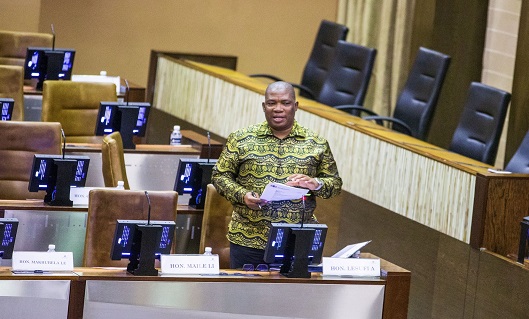Office of the Premier 2022/11/15 - 22:00

The Gauteng Provincial Government is moving ahead with its plan to establish a state bank to help fund township Small, Medium and Micro-sized Enterprises (SMMEs) and infrastructure development to help boost the economy and create jobs.
Premier Panyaza Lesufi revealed this on Tuesday during his oral reply at the provincial legislature.
According to Lesufi, establishing a state bank is an important step in extending access to financial services to all residents, specifically those who remain largely excluded from the financial services.
"The idea of the Gauteng State Bank is predicated on the principle of the state intervening in the economy.
"It is about building the state's capacity to intervene in implementing the transformational agenda aimed at including those who have been historically marginalised. Specifically, the idea is about the need to invest in the development financing agencies to bring as many people as possible into the economy."
Lesufi explained that the establishment follows the resolutions of the 54 National Conference of the ruling party, the African National Congress, which affirmed that the state must develop a more effective program to ensure access to, and ownership of financial institutions by black people, youth and women.
He added that the concept of a state bank is not new to South Africa, there is currently the Development Bank of Southern Africa, Land Bank and many other developmental finance institutions.
For its part, the Gauteng government is currently providing various banking-like services.These include the Township Economic Partnership Fund, which has approximately R650 million, the Gauteng Infrastructure Financing Agency, which has approximately R100 million and the GCRA Bursaries, which funds just under 4000 learners to the tune of R362 million.
Lesufi has appointed MEC of Finance Jacob Mamabolo and a legal advisor to investigate the process the provincial government needs to undertake to implement the bank.
Mamabolo's will investigate the market failures, gaps, and benchmarking exercise with similar state-owned banks, including the structure, funding model, feasibility and ultimate sustainability of any state bank, said Lesufi.
The legal advisor has commenced with the work, and there will also be wide-range consultations and round-table discussions with various stakeholders and experts.
Responding to questions on his public announcement calling for the writing off Soweto residents' debt to Eskom, Premier Lesufi said this would help reposition the townships as a centre of growth.
"The call made to the national government to take over the debt of townships, informal settlements and hostels (TISH), not only for Soweto, stems from our view and mission of making these areas as centres of economic growth," said Lesufi adding that most of the people in debt are unemployed and the elderly.
Soweto Eskom's debt is currently around R5 billion, and it is estimated that only R512 million is collectable.
The prospect of writing off the debt has caught the attention of President Cyril Ramaphosa during a question-and-answer session in Parliament recently.
The president said the debt could be written off, however, there needs to be conditions and discussions to find a balanced approach.
In this regard, Lesufi said the user pay principle by those who can afford it must be enforced together with the installation of prepaid meters.
The provincial government will continue to lobby and engage the national government on the modalities and finer details of writing off the debt.
"It is also important that we make it clear that we will never encourage or support non-payment of services, particularly from those who can afford it.
"Our view is that government must find ways to ensure we don't further expose the elderly and unemployed to more hardship," the premier explained.
RELATED NEWS
No related news

